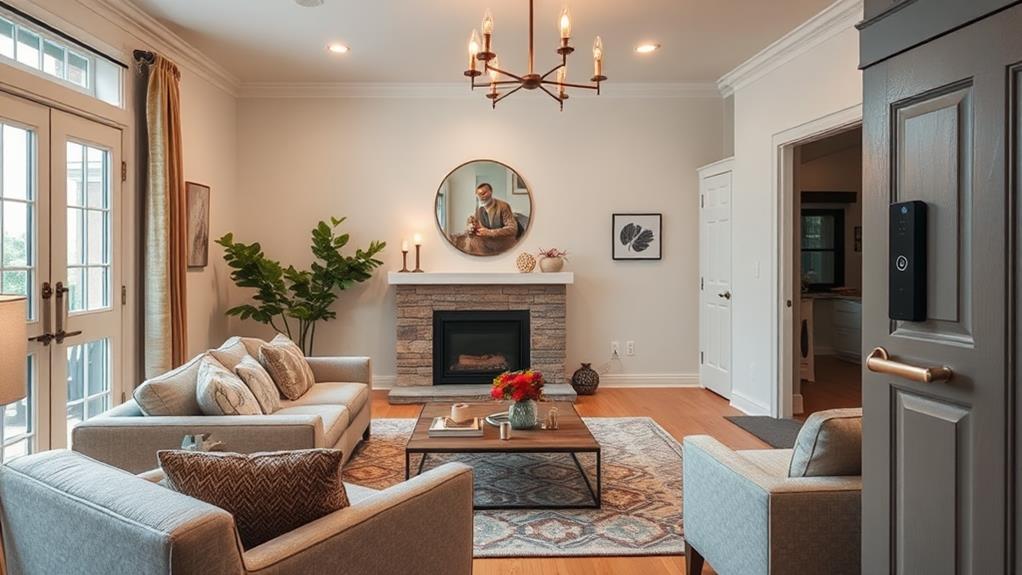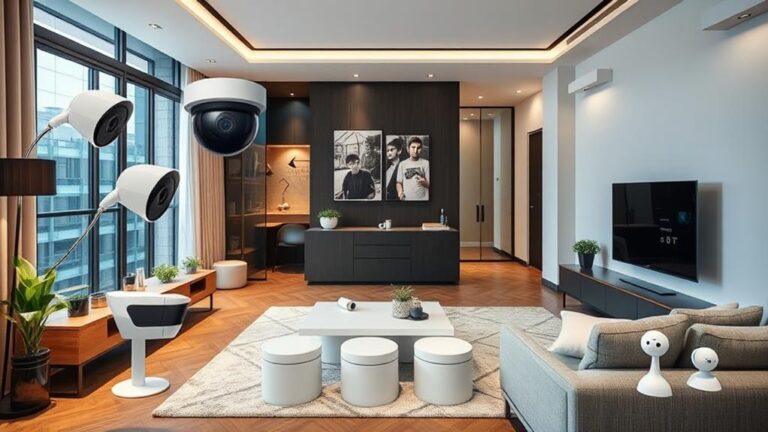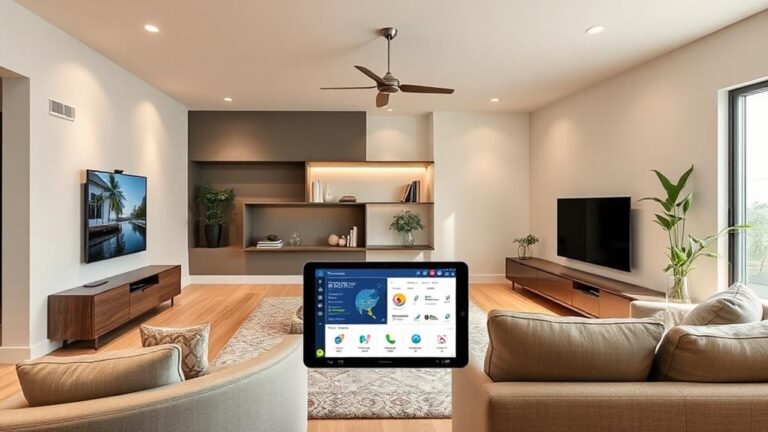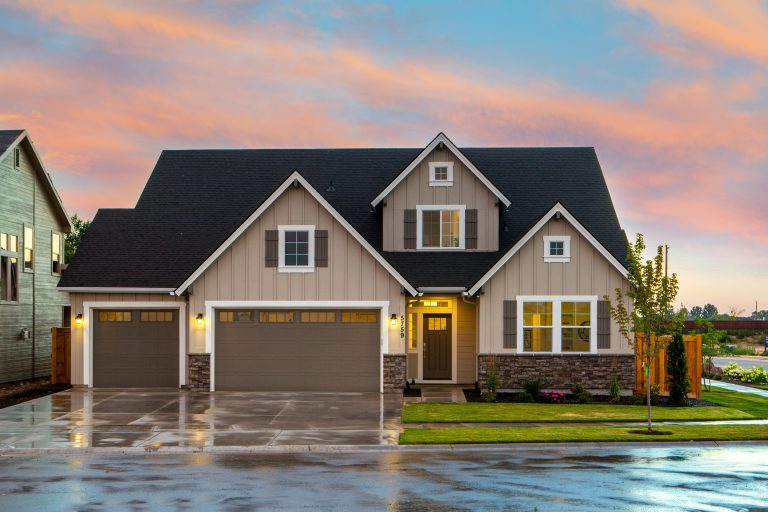Securing your home involves several fundamental steps, especially for seniors. Start by upgrading locks and deadbolts to stronger, high-security options.
Install smart security systems with integrated cameras, alarms, and sensors for thorough coverage. Use motion sensor lighting to deter potential intruders, and secure windows with locks and security films.
Reinforce entry points with solid doors and window bars. Video doorbells provide safe interaction with visitors. Establish a neighborhood watch to increase community vigilance. Manage spare keys wisely, avoiding obvious hiding spots. Educate yourself on scam awareness for online safety.
With these measures, you’ll have a solid foundation to explore further.
Main Points
- Upgrade all locks and deadbolts to high-security models to enhance protection against break-ins.
- Install smart security systems for real-time monitoring and remote access via smartphones or tablets.
- Utilize video doorbells to see and communicate with visitors without opening the door.
- Set up motion sensor lighting near entry points to deter potential intruders.
- Establish a neighborhood watch program to foster community cooperation and deter crime.
Upgrade Locks and Deadbolts
Upgrading locks and deadbolts is an essential step to home security that can’t be overlooked. New technologies in smart locks, such as multi-factor authentication and built-in alarms, can greatly improve security.
Start by evaluating the current locks on your doors. Older locks might be more vulnerable to picking or bumping, a technique where intruders use a specially cut key to open standard pin tumbler locks.
Consider installing high-security deadbolts, with features like hardened steel bolts and anti-drill plates, making them more resistant to forced entry. Additionally, verify that all exterior doors have deadbolts with at least a one-inch throw, the part of the bolt that extends into the door frame.
Remember to check window locks too, as they’re often overlooked. Reinforcing these entry points can greatly enhance your home’s security.
Install Smart Security Systems
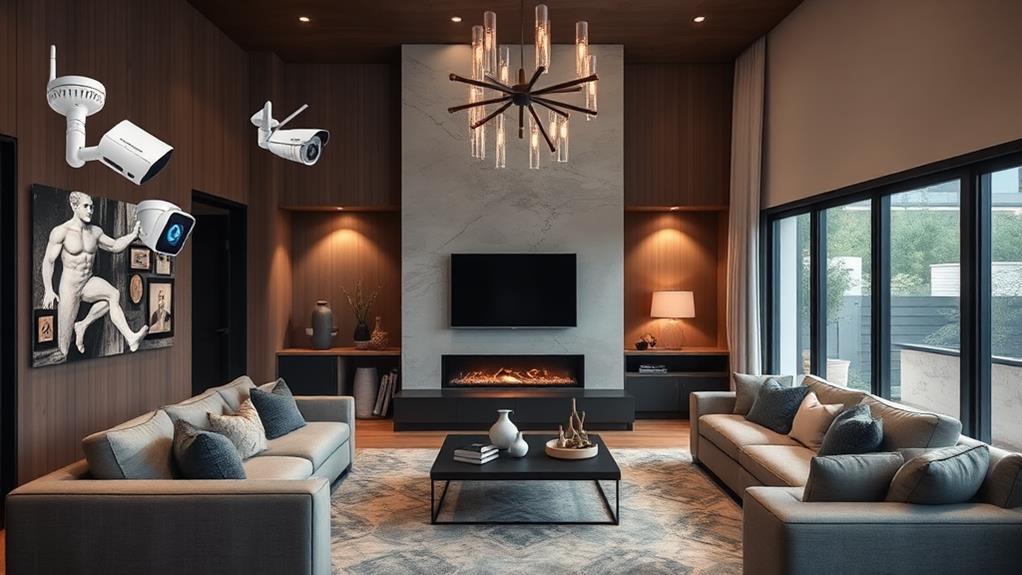
Today’s smart security systems can greatly boost your home’s protection and offer peace of mind, especially for seniors. These systems integrate devices like cameras, alarms, and sensors, all connected via the internet. Visit a website specializing in smart home security, to explore various products and solutions tailored to your needs.
You can monitor your home in real time using a smartphone or tablet, guaranteeing you’re always updated on your home’s status. Video doorbells allow you to see and communicate with visitors without opening the door.
Smart locks allow you to lock or access doors remotely, offering added convenience. Some systems include emergency response features, automatically alerting authorities if a threat is detected.
Installation is typically straightforward, but professional assistance guarantees an ideal setup. Choose systems with user-friendly interfaces to simplify operations and enhance security.
Use Motion Sensor Lighting
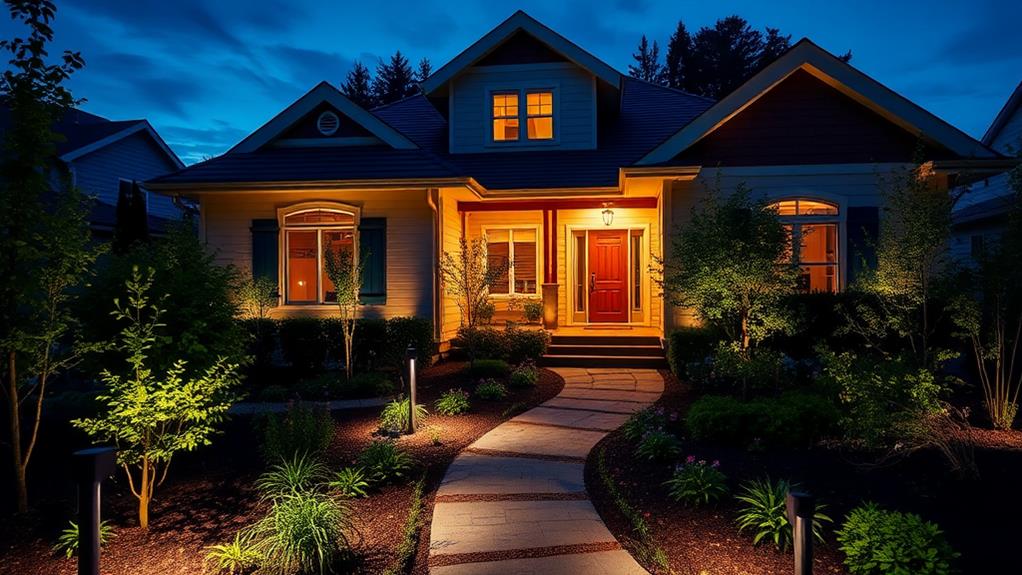
Motion sensor lighting is an effective way to enhance security around your home and reduce energy costs. These advanced systems, available from cutting-edge providers, use sophisticated technology to detect movement with high precision.
When someone approaches, these lights automatically turn on, deterring potential intruders and illuminating your path. Installing motion sensor lights is straightforward, and once set up, requires minimal maintenance.
Consider placing them in strategic locations such as:
- Entry points: Positioning them near doors or garages can discourage break-ins.
- Pathways: Ensuring walkways are well-lit reduces the risk of trips and falls.
- Backyards: Illuminating outdoor spaces can deter unwanted visitors at night.
These lights use infrared sensors to detect movement, activating only when necessary, which conserves energy. You’ll find they provide peace of mind by alerting you to activity outside, keeping your home secure.
Secure Windows Effectively
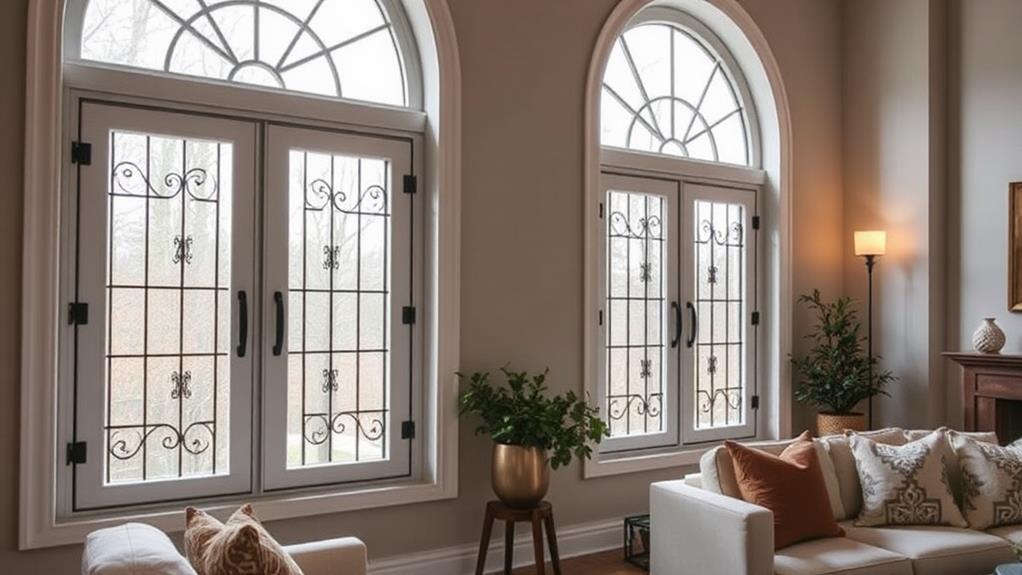
Windows are often a vulnerable entry point, so securing them effectively is essential for home safety. Start by installing window locks. These devices prevent the window from being opened from the outside, adding an extra layer of security.
Consider reinforcing glass with security film; this makes it harder to break and can act as a deterrent. Window sensors are another option, alerting you if someone tries to tamper with them.
Bars or grilles can be installed on ground-level windows for additional protection. Maintaining clear visibility is important, so trim any bushes or trees near windows to prevent hiding spots.
Regularly check the condition of window frames and latches, ensuring they’re secure and functional. Remember, consistent maintenance is key.
Reinforce Entry Points
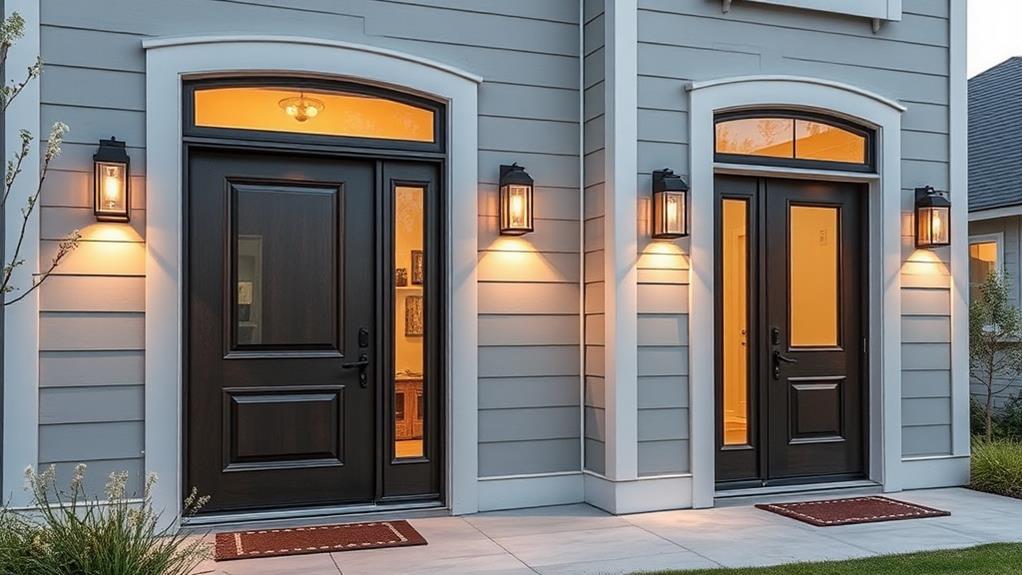
Securing windows is just one piece of the home safety puzzle. To protect your home, reinforce entry points like doors and garage access. Strong doors are your first line of defense. Consider installing solid core or metal doors, as these materials are tougher to breach.
Don’t forget about the locks; deadbolts add an extra layer of security. Integrating advanced features, like AI-powered detection, can greatly reduce false alerts and enhance security. Here are some steps you can take.
- Install a peephole: It allows you to see who’s outside without opening the door.
- Secure sliding doors: Use a metal or wooden rod in the track to prevent forced opening.
- Reinforce door frames: Adding metal plates makes frames harder to break.
These measures, combined with secure windows, enhance your home’s safety.
Set Up Surveillance Cameras
Setting up surveillance cameras is an essential step in enhancing home security. These devices deter potential intruders by providing a visual record of activity around your home. Place cameras at strategic points like entrances, driveways, and backyards to maximize coverage.
Choose models with high resolution for clear images, and night vision capabilities to function in low light. Consider wireless cameras for easy installation and flexibility. Many modern systems offer remote viewing through apps, letting you monitor your property from anywhere.
Regularly check camera functionality, so they’re operational at all times. Remember, visible cameras are often enough to discourage criminal activity, making them a significant component of your home security strategy.
Utilize Video Doorbells
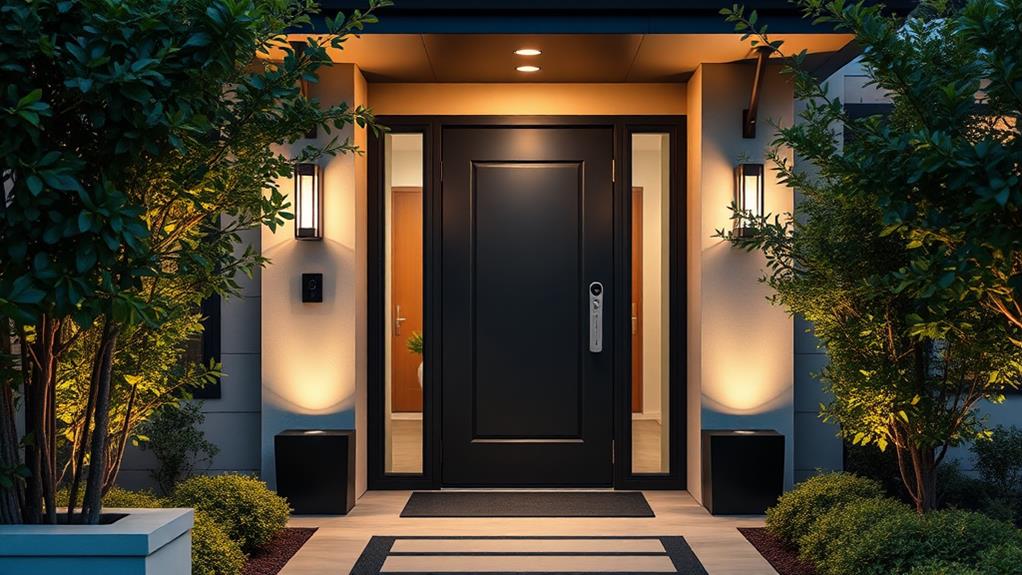
Video doorbells are a smart addition to any home security plan, especially for seniors who may prefer an extra layer of safety at their front door. These devices allow you to see and speak with visitors without opening your door, providing peace of mind. A video doorbell connects to your smartphone, allowing you to monitor your doorstep remotely.
- Two-way audio: Communicate with visitors in real-time, whether you’re home or away.
- Motion detection: Receive alerts when movement is detected, ensuring you’re aware of any activity.
- High-definition video: Capture clear images, making it easier to identify visitors or potential threats.
Installation is straightforward, often requiring just a few tools. Many models are battery-operated, eliminating the need for complex wiring. Choose a model with night vision for added protection.
Establish a Neighborhood Watch
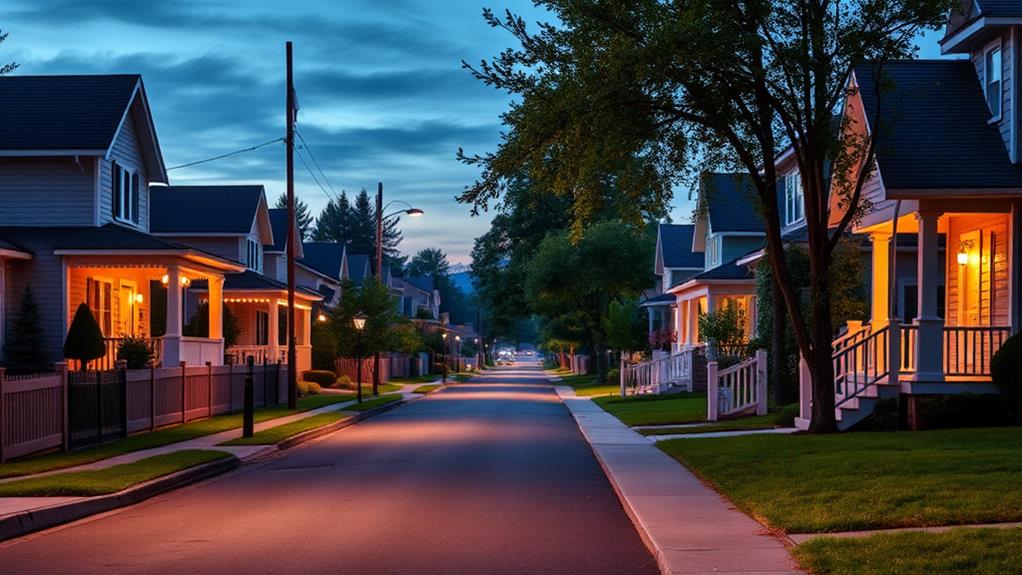
Picture a network of vigilant eyes keeping watch over your neighborhood. Establishing a neighborhood watch can greatly enhance security for seniors.
Collaborating with neighbors creates a community-based safety system that deters criminal activity.
Each member plays a role, in reporting suspicious behavior and staying informed about local issues. Regular meetings help maintain communication and update everyone on safety protocols.
You’ll want to coordinate with local law enforcement, who can provide guidance and support. They might offer training sessions on recognizing threats and responding appropriately.
A neighborhood watch isn’t just about crime prevention; it fosters community and mutual support. By actively participating, you are contributing to a safer, more connected living environment.
Manage Spare Keys Wisely
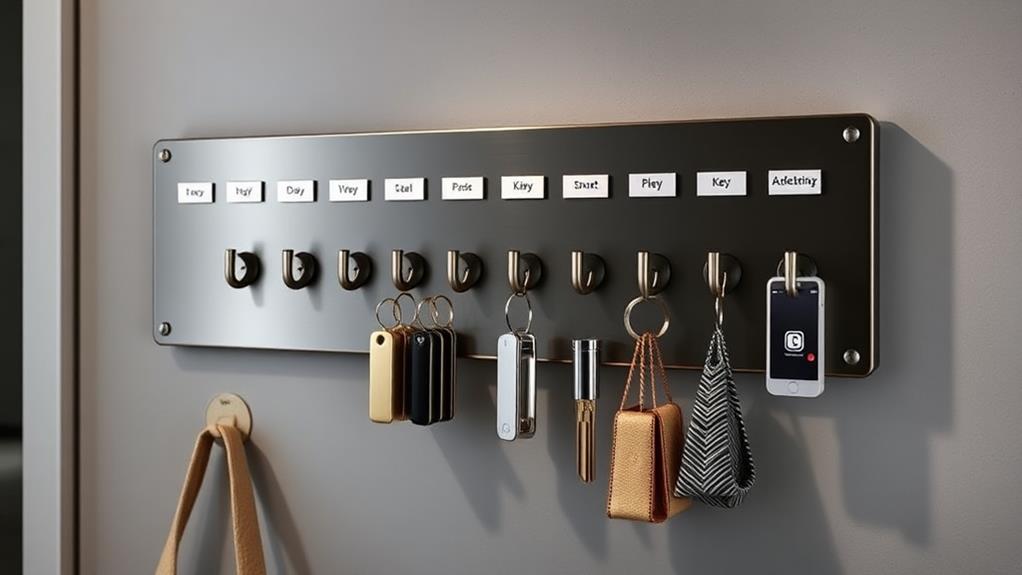
While it might seem convenient, hiding spare keys under the doormat or a garden gnome is risky and can compromise your home’s security. Instead, consider more secure alternatives for managing spare keys. You can invest in a lockbox; a small, secure container that holds keys and opens with a combination code. Placed in a discreet location it prevents unauthorized access.
Also, consider giving a spare key to a trusted neighbor or family member who lives nearby, ensuring that help is easily accessible in emergencies.
- Lockbox: Securely stores keys with a combination code.
- Trusted Neighbor: Provides a nearby option for emergencies.
- Smart Lock: Allows digital access without physical keys.
These steps can greatly enhance your home security.
Educate on Scam Awareness
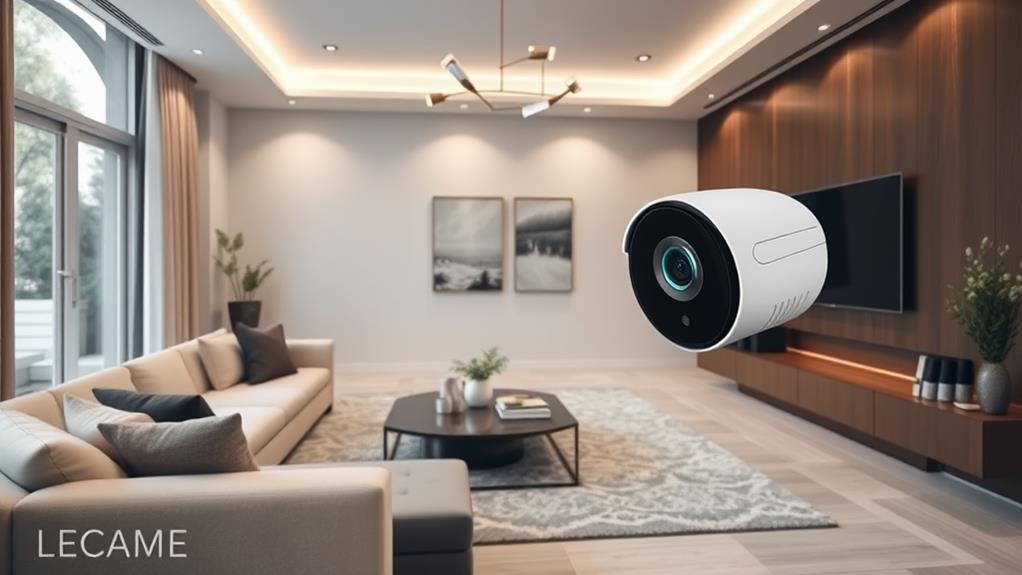
Scam awareness is essential for seniors to protect themselves from potential fraudsters. Be vigilant about unsolicited phone calls or emails requesting personal information, such as your Social Security number or banking details.
Scammers often use tactics like impersonating government officials or creating fake emergencies to trick you into revealing confidential information. Always verify the identity of the caller or sender by contacting the organization directly using official contact details.
Be cautious of offers that seem too good to be true. Fraudsters might use tactics like prize notifications or investment opportunities. Recognize phishing attempts, which often involve fake websites or emails mimicking legitimate businesses. Use strong, unique passwords for online accounts and enable two-factor authentication to add an extra layer of security.
Frequently Asked Questions
How Can Seniors Protect Their Homes During Extended Travel Periods?
Securing your home is essential if you’re away for an extended period. Start by installing smart home security systems. They allow remote monitoring through your smartphone. Use motion sensor lights to deter intruders. Be sure all doors and windows have sturdy locks, and consider adding deadbolts. Ask a neighbor to collect your mail, so it doesn’t accumulate. Set timers on lights to mimic your usual patterns, making it seem like you’re home.
What Are Some Budget-Friendly Home Security Options for Seniors?
When you’re looking for budget-friendly home security options, consider using smart doorbells, which let you see and talk to visitors remotely. Install motion-sensor lights around your property; they’re inexpensive and deter intruders. Use window locks to secure entry points, and consider a basic alarm system, which alerts you to unauthorized access. Check local resources, as some community programs offer free or discounted home security devices for seniors. Prioritize simplicity and reliability.
How Can Pets Impact Home Security Measures for Seniors?
Pets can enhance home security by deterring intruders. They often alert you to unusual sounds, acting as an early warning system. However, pets can also trigger false alarms in security systems. To mitigate this, install motion sensors at a height above where pets typically roam. Consider pet-friendly sensors, designed to differentiate between human and animal movements. Regularly train your pet to respond to commands, ensuring they don’t inadvertently compromise your security measures.
Are There Non-Technology-Based Security Options Suitable for Seniors?
You can enhance home security with non-technology-based options that are perfect for seniors. Consider installing sturdy deadbolt locks on all doors, which provide a strong physical barrier. Use door viewers, or peepholes, to identify visitors before opening the door. Implement a neighborhood watch program to foster community vigilance. Secure windows with bars or security film to prevent break-ins. Finally, maintain a well-lit exterior to deter potential intruders.
How Can Seniors Maintain Home Security While Living With Memory Impairments?
Implementing a few strategies can enhance home security for seniors with memory impairments. Install smart locks, which allow keyless entry and can be managed remotely. Use door and window sensors to alert you of any unauthorized access. Consider setting up a security system with emergency response features. Label essential items and areas, helping them remember daily routines. Regularly update and review security protocols to guarantee they remain effective.

